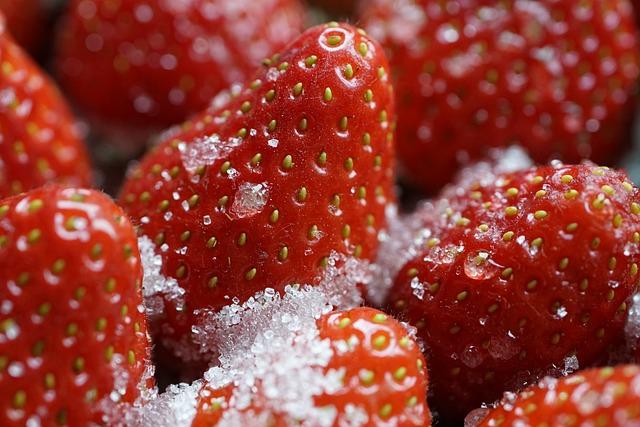In the high-octane world of sports, where milliseconds can define legacies and endurance often dictates triumph, athletes continuously seek the perfect elixir to fuel their performance. Enter the sugary sports drink—a vibrant concoction promising instant energy, rapid recovery, and electrolytes galore. Yet, as the quest for optimal performance intensifies, so does the scrutiny surrounding these colorful beverages. Are they truly the magical potions they claim to be, or do they mask a sugary underbelly that athletes should sidestep? This article delves into the science, the myths, and the realities of sugary sports drinks, inviting athletes to weigh the pros and cons before their next big game.
The Sweet Dilemma Unpacking Sugar Content in Sports Drinks
For athletes, the allure of sports drinks often lies in their promise of quick energy replenishment. However, a closer examination of these colorful concoctions reveals a significant presence of sugar, which can be a double-edged sword. On one hand, simple carbohydrates in the form of sugar provide a rapid energy boost, crucial during intense physical exertion. On the other hand, excessive sugar intake can lead to unwanted spikes in blood glucose levels and may contribute to long-term health issues if consumed regularly without moderation.
When choosing a sports drink, athletes might consider the following:
- Check the label: Look for options with lower sugar content or those sweetened with natural alternatives.
- Balance with water: Sometimes, water can be just as effective for hydration, especially for low-intensity workouts.
- Consider timing: Consuming sugary drinks immediately before or during a workout might be beneficial, but post-exercise recovery might require different nutrients.
Ultimately, understanding the sugar content in sports drinks and making informed choices can help athletes optimize their performance without compromising their health.

Performance vs. Health How Sugary Beverages Impact Athletic Performance
When it comes to athletic performance, the consumption of sugary beverages can be a double-edged sword. While these drinks are often marketed as essential for replenishing energy during intense physical activity, they can also have hidden drawbacks. Sugary sports drinks may offer a quick burst of energy due to their high carbohydrate content, but this spike is often followed by a rapid decline, leading to fatigue and decreased performance. Furthermore, excessive sugar intake can lead to weight gain and increase the risk of developing metabolic issues, which can ultimately hinder an athlete’s long-term health and endurance.
- Quick Energy Boost: Offers immediate energy but may lead to a subsequent energy crash.
- Weight Management: Excessive sugar can contribute to weight gain, negatively impacting agility and speed.
- Long-term Health Risks: Increased risk of metabolic disorders affecting overall health and performance.
For athletes seeking to optimize their performance while maintaining their health, it may be beneficial to consider alternatives to sugary sports drinks. Options such as electrolyte-infused water or natural fruit juices can provide necessary hydration and nutrients without the added sugars, ensuring sustained energy and optimal health.

Choosing Wisely Alternatives to Sugary Sports Drinks for Athletes
When it comes to staying hydrated and energized, athletes have a variety of healthier alternatives to sugary sports drinks that can provide the necessary nutrients without the added sugar. Here are some options to consider:
- Coconut Water: Known as nature’s sports drink, coconut water is rich in electrolytes like potassium and magnesium, making it an excellent option for replenishing lost minerals during intense workouts.
- Herbal Teas: Iced herbal teas, such as chamomile or mint, can be a refreshing and hydrating choice. They offer antioxidants and can be lightly sweetened with natural honey or left unsweetened for a zero-calorie option.
- Infused Water: Enhance plain water by infusing it with slices of citrus fruits, berries, or cucumber. This not only adds flavor but also provides essential vitamins and antioxidants.
For those who still crave the energy boost that sugary drinks claim to provide, consider natural energy-boosting foods like bananas or a handful of almonds. These can be consumed alongside any of the drinks mentioned above to help maintain stamina and performance without the sugar crash.

Expert Advice Tailoring Hydration Strategies for Optimal Results
When it comes to optimizing hydration strategies, athletes are often faced with a myriad of choices, each promising enhanced performance. Sugary sports drinks, while popular, may not always be the best option for everyone. These beverages are often laden with high fructose corn syrup or other sugars, which can lead to a rapid spike in blood sugar levels followed by a crash, potentially affecting performance. Additionally, excess sugar can contribute to weight gain and dental issues over time.
Instead of relying solely on these drinks, athletes might consider alternative hydration strategies that align better with their specific needs and goals. Here are some suggestions:
- Water with Electrolyte Tablets: Provides essential minerals without added sugars.
- Coconut Water: A natural source of potassium and electrolytes.
- Homemade Sports Drinks: Mix water, a pinch of salt, and a splash of natural fruit juice for a personalized beverage.
- Herbal Teas: When consumed cold, they can offer a refreshing, caffeine-free hydration option.
By tailoring hydration strategies to individual needs, athletes can maintain energy levels, enhance performance, and avoid the pitfalls of excessive sugar consumption.
Key Takeaways
As we wrap up our exploration of whether athletes should steer clear of sugary sports drinks, it becomes clear that the answer isn’t a simple yes or no. Like the intricacies of a well-played game, the decision hinges on individual needs, specific athletic demands, and personal health goals. While sugary sports drinks can offer a quick energy boost and aid in hydration during intense activities, they also carry the baggage of added sugars that can impact long-term health. As athletes navigate their unique journeys, balancing performance and well-being becomes paramount. Ultimately, the choice rests in the hands—or perhaps the water bottles—of each athlete, as they weigh the scales of sugar and stamina, seeking that perfect blend of fuel and fitness. So, whether you reach for that sugary sports drink or opt for an alternative, may your choice empower your performance and elevate your game.




